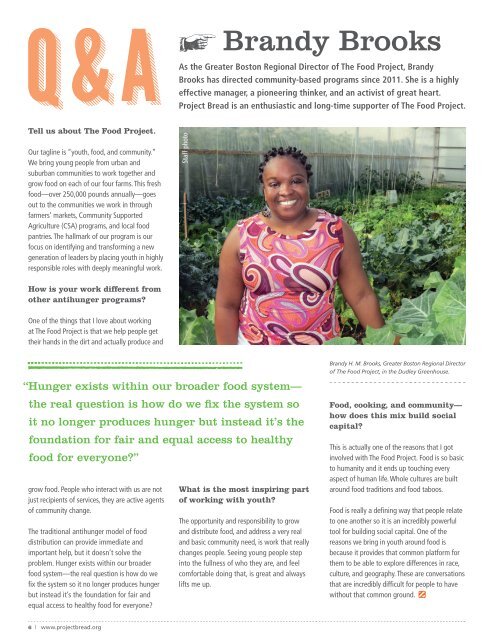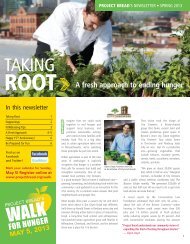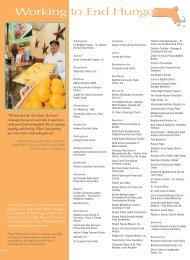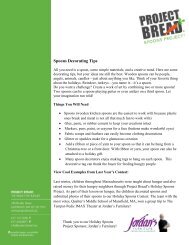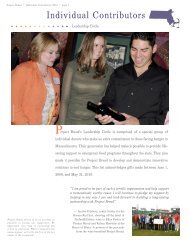Healthy food & summer fun
Summer 2013 Newsletter - Project Bread
Summer 2013 Newsletter - Project Bread
- No tags were found...
You also want an ePaper? Increase the reach of your titles
YUMPU automatically turns print PDFs into web optimized ePapers that Google loves.
Brandy Brooks<br />
As the Greater Boston Regional Director of The Food Project, Brandy<br />
Brooks has directed community-based programs since 2011. She is a highly<br />
effective manager, a pioneering thinker, and an activist of great heart.<br />
Project Bread is an enthusiastic and long-time supporter of The Food Project.<br />
Tell us about The Food Project.<br />
Our tagline is “youth, <strong>food</strong>, and community.”<br />
We bring young people from urban and<br />
suburban communities to work together and<br />
grow <strong>food</strong> on each of our four farms. This fresh<br />
<strong>food</strong>—over 250,000 pounds annually—goes<br />
out to the communities we work in through<br />
farmers’ markets, Community Supported<br />
Agriculture (CSA) programs, and local <strong>food</strong><br />
pantries. The hallmark of our program is our<br />
focus on identifying and transforming a new<br />
generation of leaders by placing youth in highly<br />
responsible roles with deeply meaningful work.<br />
Staff photo<br />
How is your work different from<br />
other antihunger programs?<br />
One of the things that I love about working<br />
at The Food Project is that we help people get<br />
their hands in the dirt and actually produce and<br />
“Hunger exists within our broader <strong>food</strong> system—<br />
the real question is how do we fix the system so<br />
it no longer produces hunger but instead it’s the<br />
foundation for fair and equal access to healthy<br />
<strong>food</strong> for everyone?”<br />
grow <strong>food</strong>. People who interact with us are not<br />
just recipients of services, they are active agents<br />
of community change.<br />
The traditional antihunger model of <strong>food</strong><br />
distribution can provide immediate and<br />
important help, but it doesn’t solve the<br />
problem. Hunger exists within our broader<br />
<strong>food</strong> system—the real question is how do we<br />
fix the system so it no longer produces hunger<br />
but instead it’s the foundation for fair and<br />
equal access to healthy <strong>food</strong> for everyone?<br />
What is the most inspiring part<br />
of working with youth?<br />
The opportunity and responsibility to grow<br />
and distribute <strong>food</strong>, and address a very real<br />
and basic community need, is work that really<br />
changes people. Seeing young people step<br />
into the fullness of who they are, and feel<br />
comfortable doing that, is great and always<br />
lifts me up.<br />
Brandy H. M. Brooks, Greater Boston Regional Director<br />
of The Food Project, in the Dudley Greenhouse.<br />
Food, cooking, and community—<br />
how does this mix build social<br />
capital?<br />
This is actually one of the reasons that I got<br />
involved with The Food Project. Food is so basic<br />
to humanity and it ends up touching every<br />
aspect of human life. Whole cultures are built<br />
around <strong>food</strong> traditions and <strong>food</strong> taboos.<br />
Food is really a defining way that people relate<br />
to one another so it is an incredibly powerful<br />
tool for building social capital. One of the<br />
reasons we bring in youth around <strong>food</strong> is<br />
because it provides that common platform for<br />
them to be able to explore differences in race,<br />
culture, and geography. These are conversations<br />
that are incredibly difficult for people to have<br />
without that common ground.<br />
6 | www.projectbread.org


